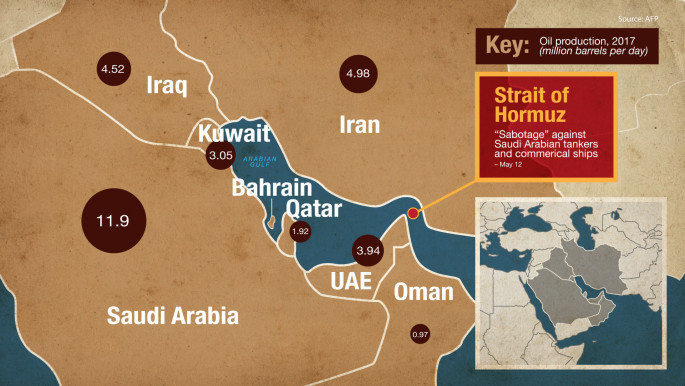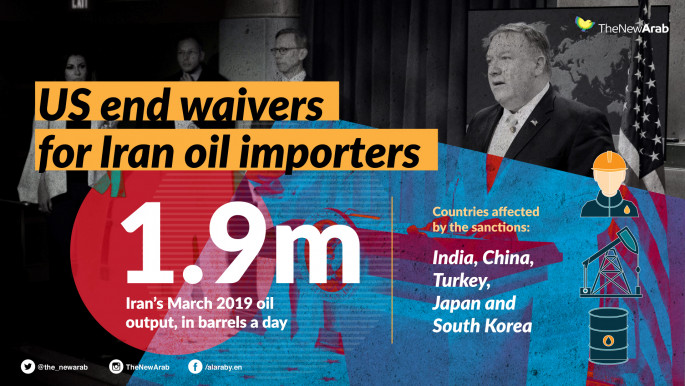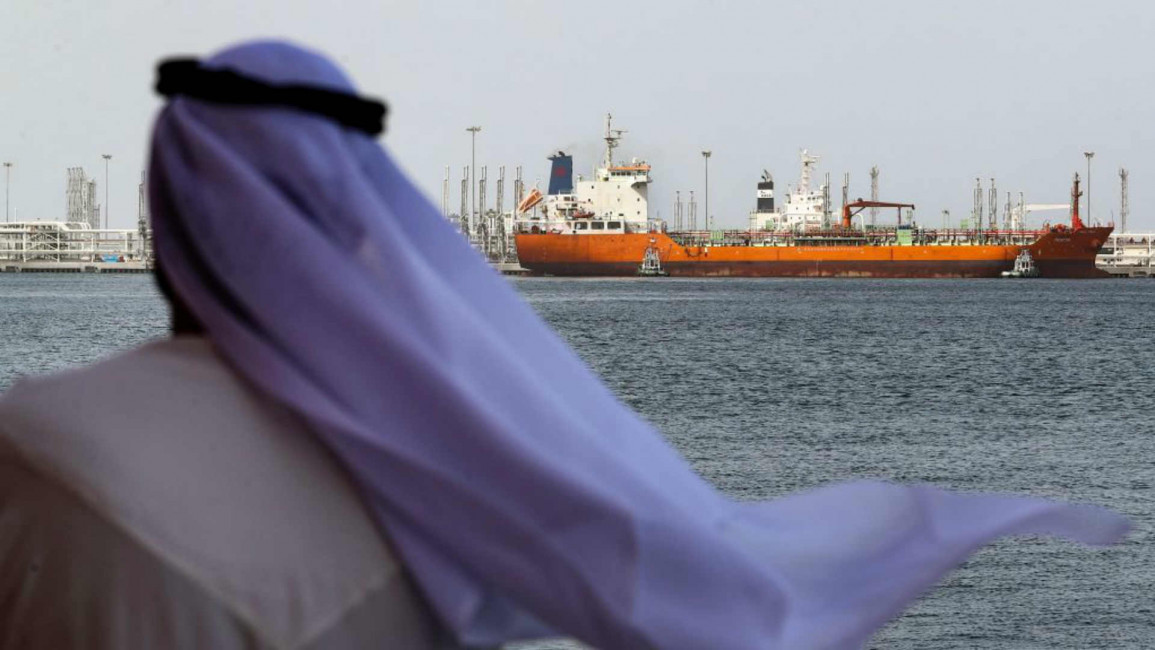
Sabre-rattling and sabotage off the coast of UAE
A year after the US pulled out of the Joint Comprehensive Plan of Action (JCPOA), the Trump administration's "maximum pressure" campaign against Tehran continues to intensify.
Such pressure from the White House has entailed the deployments of B-52 bombers to the al-Udeid Air Base in Qatar, as well as deployment of the USS Abraham Lincoln aircraft carrier strike group to the Gulf, with the apparent aim of intimidating Iran through American sabre-rattling.
On 13 May, The New York Times reported that Acting Defense Secretary Patrick Shanahan presented Trump's top national security aides with an updated military plan involving the US sending up to 120,000 troops to the Middle East, in the event that Iran attacks US forces in the region, or resumes nuclear activities that Washington deems unacceptable.
Furthermore, the fresh sanctions on Iran's steel, aluminum, and copper sectors, the end of waivers that permitted top buyers of Iranian oil to continue importing from Iran for six months, and the Islamic Revolutionary Guard Corps (IRGC) terrorist designation showcase the administration's determination to weaken, destabilise, and isolate the Islamic Republic through various economic, political, financial and legal means.
Unquestionably such escalatory moves taken by the US have created an increasingly fragile security environment in the Gulf. Put simply, the risks of a war between the US and Iran - or possibly Saudi Arabia/the United Arab Emirates (UAE) and Iran - are higher now than at any point since Iran's Islamic Revolution in 1979.
 |
Escalatory moves taken by the US have created an increasingly fragile security environment in the Gulf |  |
Thus, the stakes are especially high when security crises near the Strait of Hormuz break out, given the greater room for misunderstanding and miscalculation on the part of all actors present at this strategic chokepoint, through which one-fifth of global oil transits.
Only two days after the "sabotage" episode near Fujairah, there were drone strikes - allegedly by the Houthis - on two oil pumping stations near Riyadh that resulted in minor damage to one station that supplies a pipeline stretching from the Eastern Province to the Yanbu Port on the kingdom's Red Sea coast.
Aramco (Saudi Arabia's state-owned oil giant) consequently halted its usage of the pipeline, highlighting the Houthis' ability to exploit their enemies' economic vulnerabilities as the conflict in Yemen rages on. In condemning the "cowardly" attack, Saudi Arabia's leadership was quick to remind all that Iran supports the Houthis, underscoring Riyadh's view of Tehran bearing responsibility for its Yemeni "proxy".
 |
|
Because these events - which threated production and transferring facilities - occurred in such close succession, there will be an impact on the global oil market's psychology. Such new uncertainty grows against the backdrop of lower exports from Iran, Venezuela and Libya too. The drone attacks on Saudi Arabia's pumping stations caused US oil prices to rise 1.4 percent with Brent crude jumping 1.6 percent.
The UAE's strategic port of Fujairah, the country's main fuelling hub, is important to the UAE's overall economy. The pipeline from the Habshan onshore field in Abu Dhabi to Fujairah enables the Emiratis to export oil to the world if the Iranians close the Strait of Hormuz.
 |
This was a reminder to the Emiratis that the port of Fujairah is also vulnerable to sources of regional instability |  |
With 1.5 million barrels of oil per day being exported from Fujairah, this attack was a reminder to the Emiratis that even with a pipeline that enables oil exports from Abu Dhabi to bypass the Strait of Hormuz, Fujairah (only 140 km south of Hormuz) is also vulnerable to sources of regional instability.
If (with the emphasis on if) Iran was behind this sabotage, Tehran's intention could have possibly been to give the UAE and other Gulf Cooperation Council (GCC) member-states reason to question their wisdom in strongly backing Trump's anti-Iran agenda.
Read more: 'There will not be war with US', Iran's Khamenei says
Such operations, if orchestrated by Iran, could be intended to send a message to Abu Dhabi that Tehran has the means to make the UAE's alternative route to the Strait of Hormuz vulnerable to attacks.
Additionally, it may also have been intended as a warning to Washington, given three of the tankers targeted were Emirati/Saudi, and that the US is counting on the Emirates and Saudi Arabia to substitute most of Iran's oil supplies in the months ahead.
Considering these two GCC countries have the highest spare production capacities among OPEC's members, and that their crude types are the closest to Iranian oil, the targeting of tankers belonging to these two oil-wealthy Arab countries is particularly significant.
 |
|
It is important to note that most of America's supplies are light crude oil which is not a substitute for the heavy crude oil from the Gulf that transits the Strait of Hormuz.
Some analysts contend that this was perhaps Tehran's attempt to demonstrate its potential for fighting a war on territory belong to, or near to Arab states supporting the White House's "maximum pressure" agenda.
Naturally, such suspicions are expected within this environment of mounting regional tension.
With Iran increasingly pushed into a corner as the country's "formal" oil sale for this month was zero, officials in Tehran are considering their options.
If the Iranians are prevented from exporting their oil, they could possibly be keen to remind America's close allies in the Gulf that under such circumstances, Tehran can wage operations capable of threatening the international oil market until they can begin their exports again.
 |
Recent escalations in the US-Iran standoff could boil over into a new war |  |
Yet there is a lack of evidence linking the targeting of the vessels on 12 May to Iran.
Although investigations have begun, there are still more questions than answers. Although four vessels (two Saudi, one Emirati, and one Norwegian) near the Strait of Hormuz were targets, it is not clear who was responsible.
The question of culpability will remain open unless the US or its Gulf allies release verifiable intelligence linking the sabotage of any actor.
But even without concrete proof, certain actors will seek to capitalise on this episode to advance their political aims by pointing fingers.
Interestingly, while officials in Washington have formally "blamed Iran" and its allies/proxies for this sabotage near the UAE, officials in Riyadh and Abu Dhabi have not made any accusations, undermining the common perception that both Arab capitals are pushing the White House into embracing its hawkish posture against Tehran.
Nearly two years after the hacking of Qatar News Agency, which quickly escalated into the blockade and ongoing GCC crisis, campaigns of misinformation and the weaponisation of "fake news" can unquestionably inject much tension into an already tense environment in the Gulf.
Read more: War in the Gulf: An inconvenient truth for the Iran hawks
Thus with some Lebanese, Iranian, and Russian media outlets reporting exaggerated accounts of the damage, and stating that the Port of Fujairah itself was beset by explosions - as well as the Wall Street Journal article entitled "US Says Iran Likely Behind Ship Attacks" which cites an anonymous source in the US government with no hard evidence - irresponsible journalism can also fuel insecurity in the aftermath of such incidents as tensions were already sky high prior to both episodes.
Looking ahead, a legitimate concern for all in the region - and entire world - is that recent escalations in the US-Iran standoff could boil over into a new war. Episodes such as the sabotage off the UAE's east coast, and the drone attacks on the Saudi pumping station have the potential to trigger tit-for-tat escalatory measures between the US and Iran, that could quickly escalate beyond the control of any actor.
To be sure the diplomatic groundwork that offered opportunities for dialogue between Washington and Tehran is no longer in the picture.
The US is no longer a party to the JCPOA, and Iran is stepping back from some of its obligations under the accord. The Europeans - truly stuck between a rock and a hard place - are challenged to give Tehran reason to continue complying with the JCPOA.
As such, the potential for dangerous misunderstandings only grows as the Trump administration intensifies its threats against Iran.
Giorgio Cafiero is the CEO of Gulf State Analytics, a Washington, DC-based geopolitical risk consultancy.
Follow him on Twitter: @GiorgioCafiero
Opinions expressed in this article remain those of the author and do not necessarily represent those of The New Arab, its editorial board or staff.


![President Pezeshkian has denounced Israel's attacks on Lebanon [Getty]](/sites/default/files/styles/image_684x385/public/2173482924.jpeg?h=a5f2f23a&itok=q3evVtko)



 Follow the Middle East's top stories in English at The New Arab on Google News
Follow the Middle East's top stories in English at The New Arab on Google News


